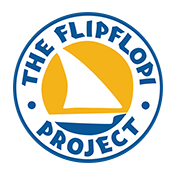A challenging start
We left Lamu in the early hours excited and apprehensive for the first challenging leg of our journey, where we sailed 120 km experiencing winds up to force 6 at times with considerable swell. This was the most testing time since the dhow had never been beyond Lamu waters, but her strength was evident, gliding through the waters in spite of the sea conditions. We spent the night, hosted by Che Shale, a great example of barefoot, sustainable living and ecotourism. Where Lamu demonstrated the spirit of collaboration and grassroot innovations, Watamu showed us how ocean communities can take the lead to create their own circular economy through sustainable business models like Ecoworld Recycling Watamu
Ecoworld: Turning trash into cash
EcoWorld Watamu Recycling is a local solution to the global problem of marine plastic litter. This innovating community enterprise works to keep the environment and to recycle plastic waste for the benefit of the community. By partnering with the local tourism industry they take waste from hotels to reduce the volume of waste going to landfill. Then plastic and glass bottles are up-cycled and used in construction to make walls and ocean marine litter is used to create art installations and curios providing an income for local women and youth groups. “We see litter as an opportunity because we can turn it into an opportunity: we see employment for waste pickers and recyclers; community artists making curios that we sell; and upcycling of bottles, plastic and glass into construction materials. That is the perfect circular economy we are aiming for in Watamu” Steve Trott, Ecoworld Watamu
Inspiring other ocean dwelling communities
We heard that what has been created in Watamu can also be replicated in other resort communities like Kilifi, Diani, Lamu, Shimoni – with residents from Lamu attending the Watamu event, there were already new collaborations and networks forming by the time we left. This is what the Flipflopi expedition is all about: home-grown initiatives like Ecoworld Watamu inspiring their neighbours in the plastic revolution.
Need for much more engagement from policy makers and business
Whilst our message is positive, it was clear from the amount of waste and roadside litter collected from the main village clean up, that the solution cannot be solved without bringing more people and policy makers into the “conservation fraternity” as one village elder put it – without waste management systems, these smaller communities, let alone, bigger towns and resorts, will be doomed to plastic pile up.
Watamu in numbers
500 attendees
5 schools came to learn and participate, ~250 school children
10 organisations participated comprising women and youth groups; conservation groups; local tourism groups (Watamu Marine Association, KWS, A Rocha Kenya, Dabaso Conservation Group, Local Ocean Conservation, Hemingways, Turtle Bay and Ocean Sports hotels, women’s groups, Kidogo Nyumbani)
1 recycling workshop
1 tour of Ecoworld
1000s of bottles and plastic waste used in the sand art competition designed to educate children about the impact of plastic on marine life
120 km travelled, wind speeds up to force 6
We were joined by Agence france presse for this leg of the expedition
Engaging the communities of Kilifi
We travelled 44km southwards from Watamu to idyllic Kilifi creek where we were hosted by the wonderful Distant Relatives ecobackpackers, whose three tenets of unity, sustainability and giving back to the community are an amazing reflection of what can be achieved through environmentally and socially responsible tourism.
We were expecting a laidback affair in Kilifi but were taken aback by the continual stream of people coming up and down from the community and beyond for this event – engaging over 400 people and 250 schoolchildren in a series of talks about the flipflopi, and workshops sharing low tech solutions for recycling bottles and putting the plastic to valuable use.
Inspiring individual action
We were privileged to be joined for this part of the expedition by plastic bag ban activist and lobbyist, James Wakibia whose evening presentation engaged dozens of young adults from the community – several questions were raised about how individuals can be more responsible, and solutions discussed including creating bottle-bricks with waste plastic for construction and materials “Don’t be afraid of making drastic changes. We are all capable of making a difference as individuals. Let’s all pledge to do something different and practical with our plastic waste today. We live off our environment, so we must do everything we can to protect it.” Summary statement from Distant relatives general manager
Spreading engagement in Kilifi county
Kilifi really demonstrated to us the level of engagement that the flipflopi clean seas programme has the potential to generate at local level: with head of police, local county government and the public health departments all participating and engaging in discussions about plastic pollution and waste management services
Kilifi by numbers
4 schools participated in the education morning, including 1 orphanage school
25 students and their Professor from the University
~400 attendees including acting director of communications in Kilifi county government, head of police, public health department, a local artist, hotel staff, recycling business start-up and local conservation groups (Takaungu creek; kilifi boatyard)
4 local areas represented (mtwapa, Mombasa, vipingo, kilifi)
2 Kenyan ambassadors of the plastic revolution - plastic activist James Wakibia and First and Former Miss tourism Lamu county Jenniffer Waridi
44 km travelled
We were joined by Barackafm, Daily Nation and NTV in Kilifi









